Why Gaza’s genocide is central to Islamophobia Awareness Month
November 11, 2024 2025-01-26 0:07Why Gaza’s genocide is central to Islamophobia Awareness Month
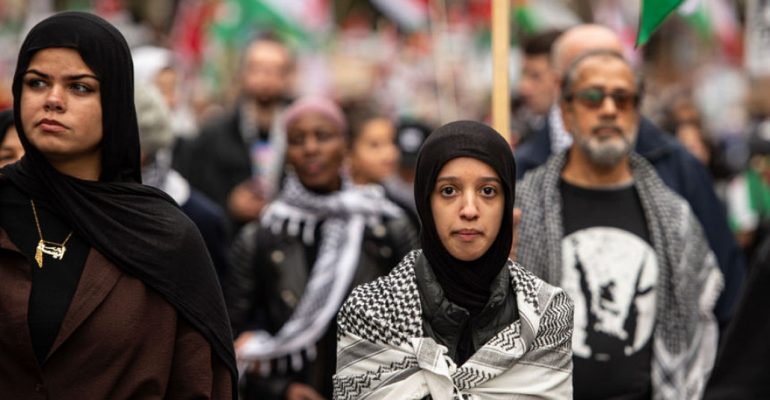
Why Gaza’s genocide is central to Islamophobia Awareness Month
Understanding the structural nature of Islamophobia helps us to better organize against the oppression of Muslims, writes Imaan Khan.
Article by Imaan Khan
Islamophobia Awareness Month (IAM) is upon us once again. During these weeks, the pervasive and worrying issues of workplace discrimination, street violence, riots and hate crime impacting the Muslim community are all brought to the fore. However, what we often find is that the root causes, that is the structural nature of Islamophobia, tends to regularly receive less attention.
Consequently, even less discussion is allocated to exposing how this facilitates and manufactures consent for the ongoing genocide in Gaza. This pervasive issue creates conditions that have allowed many in positions of power to either remain silent or openly commend the killing of thousands in Palestine.
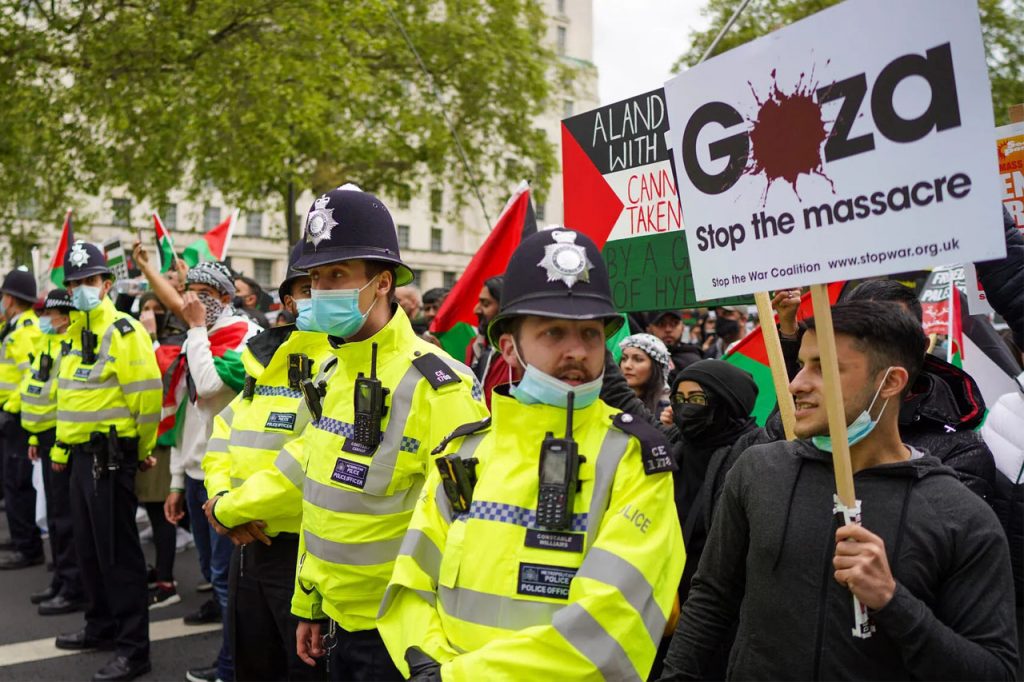
Given it is the second IAM that takes place amid the ongoing genocide in Palestine, highlighting what Israel has been doing to Palestinians and how this links to the oppression of Muslims more widely, is all the more important to what the month is supposed to serve.
Threads of Oppression
Islamophobia is systemically entrenched and fundamentally rooted in spaces of political power, where policies and narratives are crafted. Limiting the discussions during IAM to hate crime statistics and street-level incidents can distract from its pervasive nature and prominence within the British political landscape.
The PREVENT (CVE) strategy is an example of how those in power have shaped the way that citizens interact with and perceive Islam. This dynamic reached its peak during the War on Terror, which served as a critical driver of global Islamophobia, supported by significant political and economic capital.
High-level discussions across political institutions and the media focused on distinguishing between “good” and “bad” Muslims, a tactic used to divide as well as police these communities. The creation of this binary, along with the punitive measures waged against those deemed “bad,” has been driven by a highly securitized and sensationalized discourse.
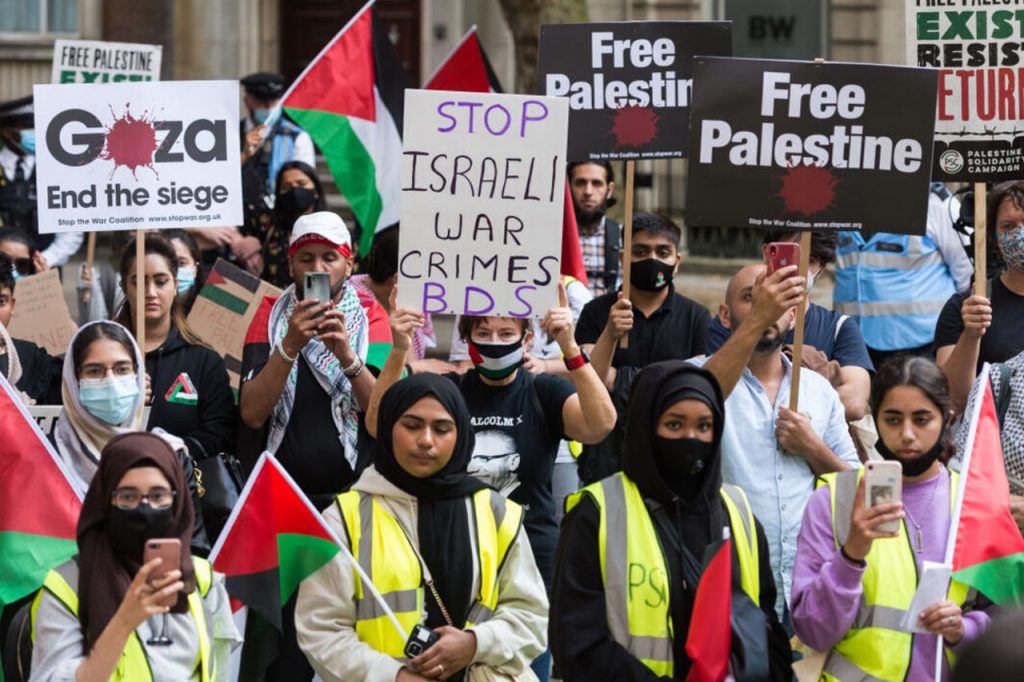
Muslims have since been increasingly portrayed as suspicious, which in turn has served to desensitize the public to the political violence being enacted on Muslims abroad under the guise of fighting terror.
Since October 7, we have witnessed these binaries playing out. From Palestinians facing ethnic cleansing being collectively represented as terrorists (or potential terrorists), to protestors being painted as sympathizers of terror for denouncing the assaults on Gaza. The aggressive targeting and even criminalization of solidarity efforts from the UK to Germany has shown that the definition of “good” amongst European states, is becoming increasingly narrow over time.
The demonization of those condemning the genocide and exercising their rights to freedom of expression and assembly, is being used to increase the repression of all across the Western continent. Indeed, one only has to look at the cases of Majid Freeman in the UK, Elias d’Imzalene in France, and the treatment of organizations like Samidoun in Canada, Germany and the US to see how pervasive this attacks on freedoms is becoming. And of course, all of the cases made against these prominent activists are rooted in Islamophobic rhetoric.
Islamophobia in Britain
The UK has regularly demonstrated how entrenched Islamophobia is. This past summer we witnessed in horror as over 25 Islamophobic and anti-immigrant riots spilled out onto the streets nationwide, marking the most significant unrest since 2011.
These violent events revealed how normalized Islamophobia has become in the UK and how it has been allowed to fester for decades. Yet, instead of alarm being raised by the government, their response was notably dismissive. Both elected officials and the British media avoided using the term Islamophobia to describe the motivations of rioters, and they failed to address the root causes behind the violence entirely.
Worse still, in the wake of the anti-Muslim riots, prominent figures such as the Home Secretary Yvette Cooper, called for the revision and strengthening of counter-extremism policies such as Prevent, disregarding the reality that this would only exacerbate Islamophobia and the criminalization of dissent. Not to mention, it would further marginalize Muslim communities.
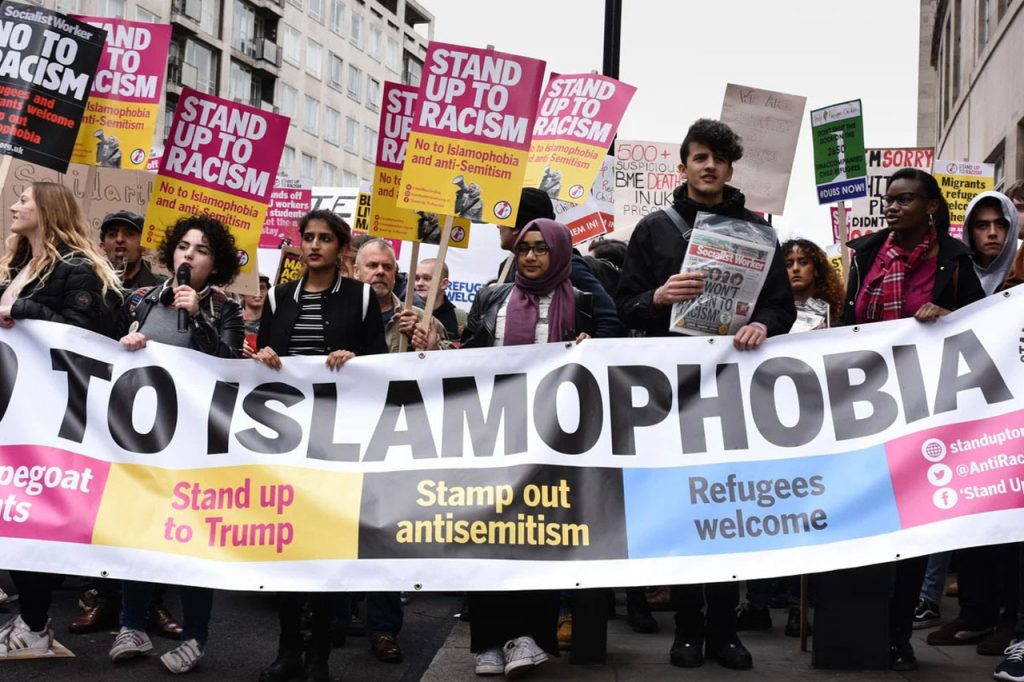
Another recent example of the widespread Islamophobia that exists is MP Zara Sultana’s interview on Good Morning Britain. Her experience illustrated how readily the oppression of Muslims is downplayed in public discourse, with presenter Kate Garraway questioning Sultana on why the term Islamophobia is even necessary if words like ‘racist’ and ‘thuggery’ have already been used.
The resistance to naming Islamophobia, even when it threatens the country’s internal stability, reflects the extent to which it has become acceptable by both the state and media.
When viewers see prominent political figures and media personalities ignoring, justifying, or even encouraging violence against Muslims abroad—particularly in Palestine—it legitimizes the use of violence against Muslims at home.
Manufacturing Consent
Dehumanization has been a prerequisite for genocide. While this is starkly evident in Israeli discourse, it also occurs within our own borders in the UK. It is the result of decades of persistent dehumanization of Muslims that the killing of Palestinians has been allowed to take place with little opposition from those in power.
Labelling the people of Palestine with Islamophobic and racist tropes decontextualizes their resistance, framing them within an outdated narrative that suggests a primitive desire for violence as a driving force, rather than justice and liberation. Such portrayals depict Muslims as unruly and in need of control, creating justifications for the use of violence against them.
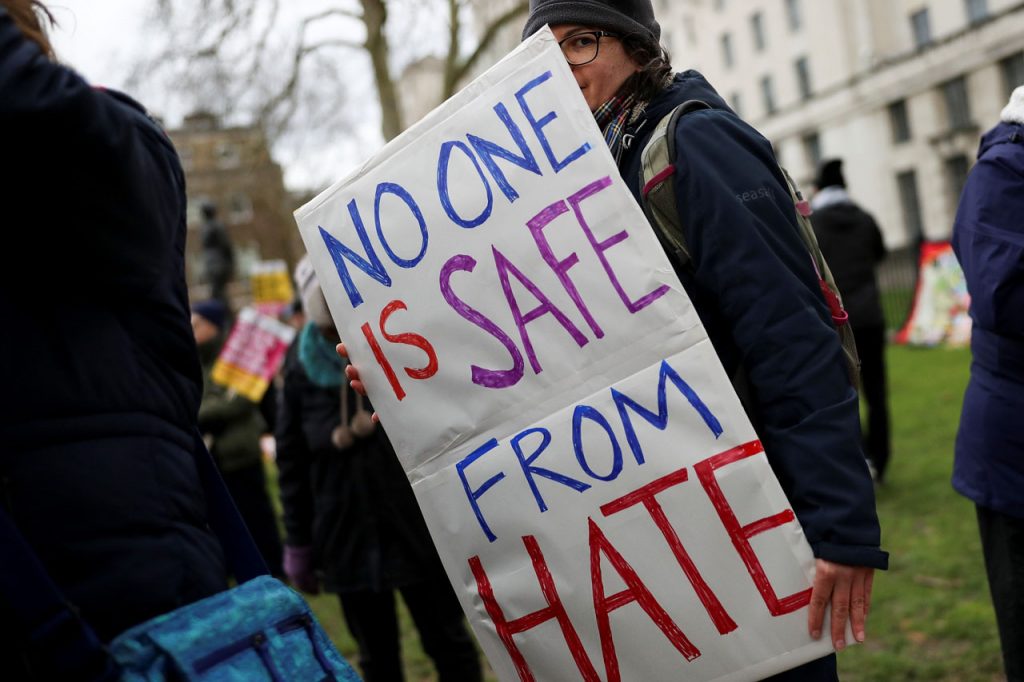
Furthermore, the murder of thousands of Palestinians is downplayed in an attempt to eliminate any potential lingering scrutiny in the minds of the public. We only have to look at how the killing of children is reported, like six-year old Hind Rajab who was referred to by a CNN reporter as a ‘woman killed in Gaza’ while Israeli soldiers are referred to in a since edited Sky News headline as ‘teenage victims’. These representations of violence lay bare the extent to which Islamophobic narratives, grounded in War on Terror rhetoric, are used amidst genocidal violence.
To effectively address Islamophobia, community focus and efforts must go towards dismantling the War on Terror and counterterrorism laws and policies. This involves standing firm against intimidation, knowing our rights, and continuing to advocate for Palestine without restriction.
Finally, we cannot uproot Islamophobia by collaborating with the very institutions that sustain it. We must speak truth to power and organize to defend our communities independently of the state. We must hold the media accountable for misrepresentation and the normalization of the injustice Muslims are constantly subjected to. We must prioritize the root causes of Islamophobia, rather than merely addressing its symptoms.
Source: The New Arab







